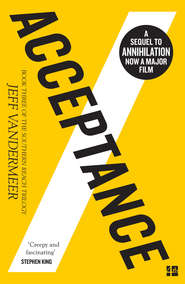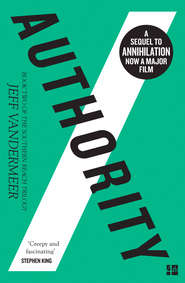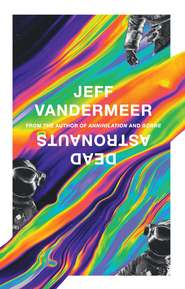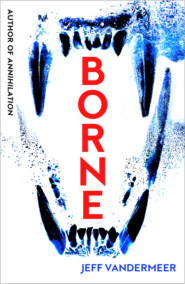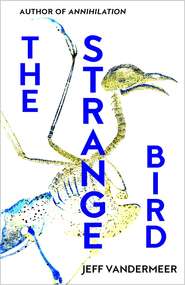По всем вопросам обращайтесь на: info@litportal.ru
(©) 2003-2024.
✖
Annihilation: The thrilling book behind the most anticipated film of 2018
Настройки чтения
Размер шрифта
Высота строк
Поля
With a strange smirk, almost as if judging us, the surveyor descended until we could only see her face framed in the gloom below, and then not even that. She left an empty space that was shocking to me, as if the reverse had actually happened: as if a face had suddenly floated into view out of the darkness. I gasped, which drew a stare from the psychologist. The anthropologist was too busy staring down into the stairwell to notice any of it.
“Is everything okay?” the psychologist called out to the surveyor. Everything had been fine just a second before. Why would anything be different now?
The surveyor made a sharp grunt in answer, as if agreeing with me. For a few moments more, we could still hear the surveyor struggling on those short steps. Then came silence, and then another movement, at a different rhythm, which for a terrifying moment seemed like it might come from a second source.
But then the surveyor called up to us. “Clear to this level!” This level. Something within me thrilled to the fact that my vision of a tower was not yet disproven.
That was the signal for me to descend with the anthropologist, while the psychologist stood watch. “Time to go,” the psychologist said, as perfunctorily as if we were in school and a class was letting out.
An emotion that I could not quite identify surged through me, and for a moment I saw dark spots in my field of vision. I followed the anthropologist so eagerly down through the remains of webs and the embalmed husks of insects into the cool brackishness of that place that I almost tripped her. My last view of the world above: the psychologist peering down at me with a slight frown, and behind her the trees, the blue of the sky almost blinding against the darkness of the sides of the stairwell.
Below, shadows spread across the walls. The temperature dropped and sound became muffled, the soft steps absorbing our tread. Approximately twenty feet beneath the surface, the structure opened out into a lower level. The ceiling was about eight feet high, which meant a good twelve feet of stone lay above us. The flashlight of the surveyor’s assault rifle illuminated the space, but she was faced away from us, surveying the walls, which were an off-white and devoid of any adornment. A few cracks indicated either the passage of time or some sudden stressor. The level appeared to be the same circumference as the exposed top, which again supported the idea of a single solid structure buried in the earth.
“It goes farther,” the surveyor said, and pointed with her rifle to the far corner, directly opposite the opening where we had come out onto that level. A rounded archway stood there, and a darkness that suggested downward steps. A tower, which made this level not so much a floor as a landing or part of the turret. She started to walk toward the archway while I was still engrossed in examining the walls with my flashlight. Their very blankness mesmerized me. I tried to imagine the builder of this place but could not.
I thought again of the silhouette of the lighthouse, as I had seen it during the late afternoon of our first day at base camp. We assumed that the structure in question was a lighthouse because the map showed a lighthouse at that location and because everyone immediately recognized what a lighthouse should look like. In fact, the surveyor and anthropologist had both expressed a kind of relief when they had seen the lighthouse. Its appearance on both the map and in reality reassured them, anchored them. Being familiar with its function further reassured them.
With the tower, we knew none of these things. We could not intuit its full outline. We had no sense of its purpose. And now that we had begun to descend into it, the tower still failed to reveal any hint of these things. The psychologist might recite the measurements of the “top” of the tower, but those numbers meant nothing, had no wider context. Without context, clinging to those numbers was a form of madness.
“There is a regularity to the circle, seen from the inside walls, that suggests precision in the creation of the building,” the anthropologist said. The building. Already she had begun to abandon the idea of it being a tunnel.
All of my thoughts came spilling out of my mouth, some final discharge from the state that had overtaken me above. “But what is its purpose? And is it believable that it would not be on the maps? Could one of the prior expeditions have built it and hidden it?” I asked all of this and more, not expecting an answer. Even though no threat had revealed itself, it seemed important to eliminate any possible moment of silence. As if somehow the blankness of the walls fed off of silence, and that something might appear in the spaces between our words if we were not careful. Had I expressed this anxiety to the psychologist, she would have been worried, I know. But I was more attuned to solitude than any of us, and I would have characterized that place in that moment of our exploration as watchful.
A gasp from the surveyor cut me off in mid-question, no doubt much to the anthropologist’s relief.
“Look!” the surveyor said, training her flashlight down into the archway. We hurried over and stared past her, adding our own illumination.
A stairway did indeed lead down, this time at a gentle curve with much broader steps, but still made of the same materials. At about shoulder height, perhaps five feet high, clinging to the inner wall of the tower, I saw what I first took to be dimly sparkling green vines progressing down into the darkness. I had a sudden absurd memory of the floral wallpaper treatment that had lined the bathroom of my house when I had shared it with my husband. Then, as I stared, the “vines” resolved further, and I saw that they were words, in cursive, the letters raised about six inches off the wall.
“Hold the light,” I said, and pushed past them down the first few steps. Blood was rushing through my head again, a roaring confusion in my ears. It was an act of supreme control to walk those few paces. I couldn’t tell you what impulse drove me, except that I was the biologist and this looked oddly organic. If the linguist had been there, perhaps I would have deferred to her.
“Don’t touch it, whatever it is,” the anthropologist warned.
I nodded, but I was too enthralled with the discovery. If I’d had the impulse to touch the words on the wall, I would not have been able to stop myself.
As I came close, did it surprise me that I could understand the language the words were written in? Yes. Did it fill me with a kind of elation and dread intertwined? Yes. I tried to suppress the thousand new questions rising up inside of me. In as calm a voice as I could manage, aware of the importance of that moment, I read from the beginning, aloud: “Where lies the strangling fruit that came from the hand of the sinner I shall bring forth the seeds of the dead to share with the worms that …”
Then the darkness took it.
“Words? Words?” the anthropologist said.
Yes, words.
“What are they made of?” the surveyor asked. Did they need to be made of anything?
The illumination cast on the continuing sentence quavered and shook. Where lies the strangling fruit became bathed in shadow and in light, as if a battle raged for its meaning.
“Give me a moment. I need to get closer.” Did I? Yes, I needed to get closer.
What are they made of?
I hadn’t even thought of this, though I should have; I was still trying to parse the lingual meaning, had not transitioned to the idea of taking a physical sample. But what relief at the question! Because it helped me fight the compulsion to keep reading, to descend into the greater darkness and keep descending until I had read all there was to read. Already those initial phrases were infiltrating my mind in unexpected ways, finding fertile ground.
So I stepped closer, peered at Where lies the strangling fruit. I saw that the letters, connected by their cursive script, were made from what would have looked to the layperson like rich green fernlike moss but in fact was probably a type of fungi or other eukaryotic organism. The curling filaments were all packed very close together and rising out from the wall. A loamy smell came from the words along with an underlying hint of rotting honey. This miniature forest swayed, almost imperceptibly, like sea grass in a gentle ocean current.
Other things existed in this miniature ecosystem. Half-hidden by the green filaments, most of these creatures were translucent and shaped like tiny hands embedded by the base of the palm. Golden nodules capped the fingers on these “hands.” I leaned in closer, like a fool, like someone who had not had months of survival training or ever studied biology. Someone tricked into thinking that words should be read.
I was unlucky—or was I lucky? Triggered by a disturbance in the flow of air, a nodule in the W chose that moment to burst open and a tiny spray of golden spores spewed out. I pulled back, but I thought I had felt something enter my nose, experienced a pinprick of escalation in the smell of rotting honey.
Unnerved, I stepped back even farther, borrowing some of the surveyor’s best curses, but only in my head. My natural instinct was always for concealment. Already I was imagining the psychologist’s reaction to my contamination, if revealed to the group.
“Some sort of fungi,” I said finally, taking a deep breath so I could control my voice. “The letters are made from fruiting bodies.” Who knew if it were actually true? It was just the closest thing to an answer.
My voice must have seemed calmer than my actual thoughts because there was no hesitation in their response. No hint in their tone of having seen the spores erupt into my face. I had been so close. The spores had been so tiny, so insignificant. I shall bring forth the seeds of the dead.
“Words? Made of fungi?” the surveyor said, stupidly echoing me.
“There is no recorded human language that uses this method of writing,” the anthropologist said. “Is there any animal that communicates in this way?”
I had to laugh. “No, there is no animal that communicates in this way.” Or, if there were, I could not recall its name, and never did later, either.
“Are you joking? This is a joke, right?” the surveyor said. She looked poised to come down and prove me wrong, but didn’t move from her position.
“Fruiting bodies,” I replied, almost as if in a trance. “Forming words.”
A calm had settled over me. A competing sensation, as if I couldn’t breathe, or didn’t want to, was clearly psychological not physiological. I had noticed no physical changes, and on some level it didn’t matter. I knew it was unlikely we had an antidote to something so unknown waiting back at the camp.
More than anything, the information I was trying to process immobilized me. The words were composed of symbiotic fruiting bodies from a species unknown to me. Second, the dusting of spores on the words meant that the farther down into the tower we explored, the more the air would be full of potential contaminants. Was there any reason to relay this information to the others when it would only alarm them? No, I decided, perhaps selfishly. It was more important to make sure they were not directly exposed until we could come back with the proper equipment. Any other evaluation depended on environmental and biological factors about which I was increasingly convinced I had inadequate data.
I came back up the stairs to the landing. The surveyor and the anthropologist looked expectant, as if I could tell them more. The anthropologist in particular was on edge; her gaze couldn’t alight on any one thing but kept moving and moving. Perhaps I could have fabricated information that would have stopped that incessant search. But what could I tell them about the words on the wall except that they were either impossible or insane, or both? I would have preferred the words be written in an unknown language; this would have presented less of a mystery for us to solve, in a way.
“We should go back up,” I said. It was not that I recommended this as the best course of action but because I wanted to limit their exposure to the spores until I could see what long-term effects they might have on me. I also knew if I stayed there much longer I might experience a compulsion to go back down the stairs to continue reading the words, and they would have to physically restrain me, and I did not know what I would do then.
There was no argument from the other two. But as we climbed back up, I had a moment of vertigo despite being in such an enclosed space, a kind of panic for a moment, in which the walls suddenly had a fleshy aspect to them, as if we traveled inside of the gullet of a beast.
When we told the psychologist what we had seen, when I recited some of the words, she seemed at first frozen in an oddly attentive way. Then she decided to descend to view the words. I struggled with whether I should warn her against this action. Finally I said, “Only observe from the top of the stairs. We don’t know whether there are toxins. When we come back, we should wear breathing masks.” These, at least, we had inherited from the last expedition, in a sealed container.
“Paralysis is not a cogent analysis?” she said to me with a pointed stare. I felt a kind of itchiness come over me, but I said nothing, did nothing. The others did not even seem to realize she had spoken. It was only later that I realized the psychologist had tried to bind me with a hypnotic suggestion meant for me and me alone.
My reaction apparently fell within the range of acceptable responses, for she descended while we waited anxiously above. What would we do if she did not return? A sense of ownership swept over me. I was agitated by the idea that she might experience the same need to read further and would act upon it. Even though I didn’t know what the words meant, I wanted them to mean something so that I might more swiftly remove doubt, bring reason back into all of my equations. Such thoughts distracted me from thinking about the effects of the spores on my system.
Thankfully the other two had no desire to talk as we waited, and after just fifteen minutes the psychologist awkwardly pushed her way up out of the stairwell and into the light, blinking as her vision adjusted.
“Interesting,” she said in a flat tone as she loomed over us, wiping the cobwebs from her clothing. “I have never seen anything like that before.” She seemed as if she might continue, but then decided against it.
What she had already said verged on the moronic; apparently I was not alone in that assessment.
“Interesting?” the anthropologist said. “No one has ever seen anything like that in the entire history of the world. No one. Ever. And you call it interesting?” She seemed close to working herself into a bout of hysteria. While the surveyor just stared at both of them as if they were the alien organisms.






